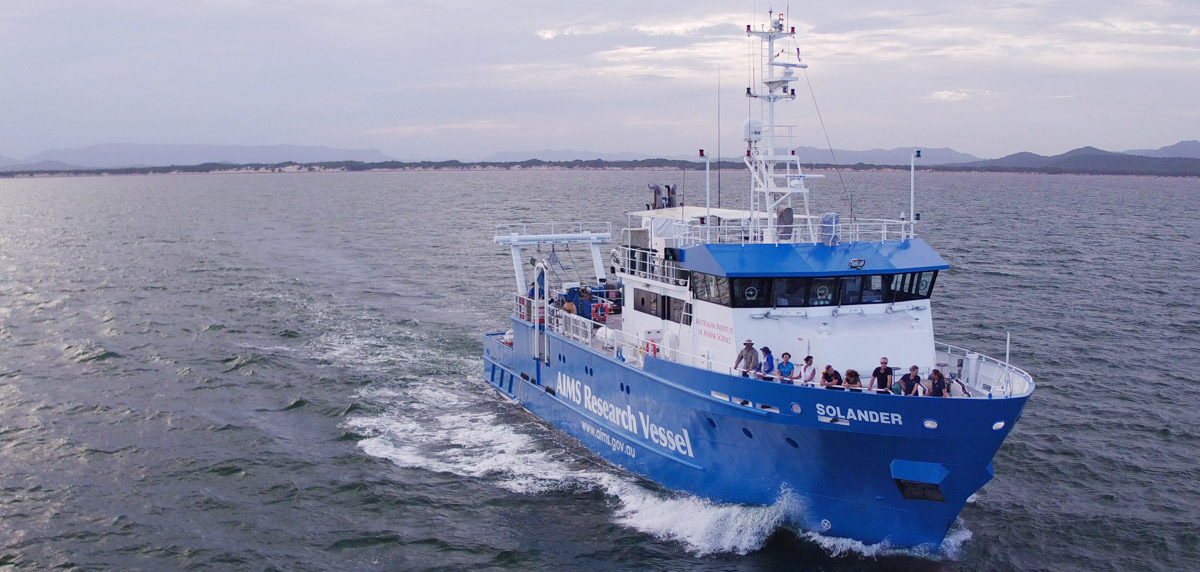
Global S&T Development Trend Analysis Platform of Resources and Environment
| AIMS’ biggest research vessel called in to give health check on remote Great Barrier Reef | |
| admin | |
| 2019-01-21 | |
| 发布年 | 2019 |
| 语种 | 英语 |
| 国家 | 澳大利亚 |
| 领域 | 资源环境 |
| 正文(英文) |
The largest research vessel in the Australian Institute of Marine Science’ fleet is in Queensland waters for the first time, to help scientists conduct a 25-day health check of remote far northern reefs. AIMS CEO Dr Paul Hardisty said he had mobilised the vessel, to bring the science to the field to help better understand and support the national icon, which generates an estimated $6 billion for Australia and 64,000 jobs. “It is the first time our 34.9m West Australian-based RV Solander, with its specialised laboratories, flow-through aquariums, and high-tech computing and diving facilities for the 18 AIMS scientists and crew onboard, has visited Queensland waters,” Dr Hardisty said. He said as well as monitoring for potential bleaching, AIMS researchers were looking to see if surviving corals from previous bleaching events had developed increased tolerance to warmer waters, a good indication of the resilience of a reef. AIMS Long-Term Monitoring Program acting manager Dr Mike Emslie said the expedition was part of AIMS’ commitment to survey the health of the Great Barrier Reef including the far northern region, as it has done every two years for the past 35 years. “We intend to survey more than 20 remote reefs off Cape York to observe their condition, and check for signs of recovery in young coral recruits, after the 2016 and 2017 coral bleaching.” “Our team last surveyed these remote reefs in late 2016, after a severe coral bleaching event affected this region.” AIMS Healthy and Resilient Great Barrier Reef program director Dr Britta Schaffelke said the Institute’s marine researchers were monitoring reefs from Cooktown, to Princess Charlotte Bay and reefs around Cape Grenville. “This long-term, large scale monitoring we are undertaking, gives our researchers an unparalleled understanding of the condition of coastal and offshore coral reef ecosystems and their ability to recover after being disturbed,” Dr Schaffelke said. “While we are there, we will also collect data on other health indicators such as coral disease, coral predators such as crown-of-thorns-starfish, we will monitor reef structure through 3D image capture, and we have baited underwater cameras and divers to check on fish numbers and diversity.
Dr Schaffelke said the researchers were looking closely at surviving corals to see if they had increased tolerance to warmer waters, a good indication of the resilience of a reef. “Identifying the genes responsible for heat tolerance in corals will help us better manage reefs of the future by identifying key populations to protect key reefs, to ensure reef resilience, and to also identify potential brood stock for use in reef restoration activities. “While the situation has eased, there is still a potential for warm sea temperatures to cause coral bleaching on the Great Barrier Reef this year.”
As part of AIMS’ close ties with Traditional Owners, a Sea Ranger from the Cape York region is on board the RV Solander to advise on traditional knowledge of the area and is helping build closer monitoring partnerships for the future. The expedition, which started in Cooktown on January 4, and finishes on January 29, is the first project to be supported with funding from the Great Barrier Reef Foundation’s Reef Trust Partnership. Other stakeholders include the National Environmental Science Program (NESP), which has funded a project onboard, with AIMS partners such as Great Barrier Reef Marine Park Authority utilising the long-term monitoring information gathered. You may also be interested in...
|
| URL | 查看原文 |
| 来源平台 | Australian Institute of Marine Science |
| 文献类型 | 新闻 |
| 条目标识符 | http://119.78.100.173/C666/handle/2XK7JSWQ/233014 |
| 专题 | 资源环境科学 |
| 推荐引用方式 GB/T 7714 | admin. AIMS’ biggest research vessel called in to give health check on remote Great Barrier Reef. 2019. |
| 条目包含的文件 | 条目无相关文件。 | |||||
| 个性服务 |
| 推荐该条目 |
| 保存到收藏夹 |
| 查看访问统计 |
| 导出为Endnote文件 |
| 谷歌学术 |
| 谷歌学术中相似的文章 |
| [admin]的文章 |
| 百度学术 |
| 百度学术中相似的文章 |
| [admin]的文章 |
| 必应学术 |
| 必应学术中相似的文章 |
| [admin]的文章 |
| 相关权益政策 |
| 暂无数据 |
| 收藏/分享 |
除非特别说明,本系统中所有内容都受版权保护,并保留所有权利。
修改评论